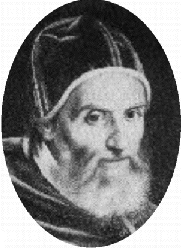May 13: Gregory XIII and Calendar Reform
Pope Gregory XIII Elected (1572):
Churches v. Calendar Reform
It was on this date, May 13, 1572, that Ugo Buoncompagni was elected Pope Gregory XIII at age 70. An unwed father as a youth and "worldly-minded and fond of display" most of his life (a polite way of saying he loved women and luxury), his age may explain why he no longer sowed wild oats. He was an unapologetic nepotist, elevating worthless family members to high clerical office, and ineffective in world affairs. His papacy was noted for his attempt to force education on the ignorant clergy, and to force Catholicism back onto the intransigent Protestants — indeed, he struck a gold medal commemorating the massacre of Huguenots on Saint Bartholomew's Day (24 August 1572) in Paris. But Gregory XIII is remembered in history for one innovation: the calendar reform that bears his name.
For 1500 years, Christendom had been using the Julian calendar, named after Julius Caesar, but 13th century astronomers — educated by Arabic translations of classical Greek texts — had noted that Easter was drifting into summer and separating from the Vernal Equinox; that the assumption that a year comprised exactly 365 days plus six hours was about 11 minutes too long, but that those 11 minutes added up considerably over time! Pope Clement VI had sought some advice on calendar reform in 1344. The reform might have been instituted in 1349 had it not been for Clement's demise in the Black Death that year. Reform was thwarted several more times over the years by death, deposition, and politics.
Indeed, it was politics that stopped the adoption of the new "Gregorian" calendar in Protestant countries. Catholic Europe, and especially the vehemently anti-Protestant Gregory, saw the new calendar as a weapon against the Protestant heresy in the Counter-Reformation. Using mathematics as a weapon against Protestants turned out to be a singularly stupid strategy. As a result, Protestant countries in particular, later including the new United States, took centuries to adopt the Gregorian calendar. Russia was one of the last to do so.
In the papal bull Inter Gravissimas, signed on 24 February 1582 (Old Style), Pope Gregory XIII declared that October 4 should immediately be followed by October 15, omitting the ten days between. "In Protestant Germany, about the same period," A.D. White pointed out in his classic Warfare of Science with Theology,
Plieninger took a dislike to the new Gregorian calendar and published a volume of Brief Reflections, in which he insisted that the elements had given utterance to God's anger against it, calling attention to the fact that violent storms raged over almost all Germany during the very ten days which the Pope had taken out for the correction of the year, and that great floods began with the first days of the corrected year." (vi, p333)
It would seem to the less credulous that, if God were really opposed to the new calendar, He might have taken more direct action against it. Or, if the universe were really Intelligently Designed, the Designer would have fit the universe to the calendar better in the first place!
An English astronomer named John Dee found a flaw in the Catholic year-length calculation — or copied it from Omar Khayyam, who had actually figured it to 11 decimal places in the 11th century — and that correction was exploited to give a Biblical basis to the explorations and discoveries that culminated in the colonization of America. Thus it was manifest necessity, power politics and plague, rather than God, that finally brought the calendar in line with the cosmos. The calendar reform occurred on Gregory's watch, but Rome was still steeped in corruption, banditry, and prostitution — one courtesan, chiefly ministering to prelates, made a fortune of six figures! — after Gregory XIII was elected pope on this date in 1572.
Originally published May 2003 by Ronald Bruce Meyer.


